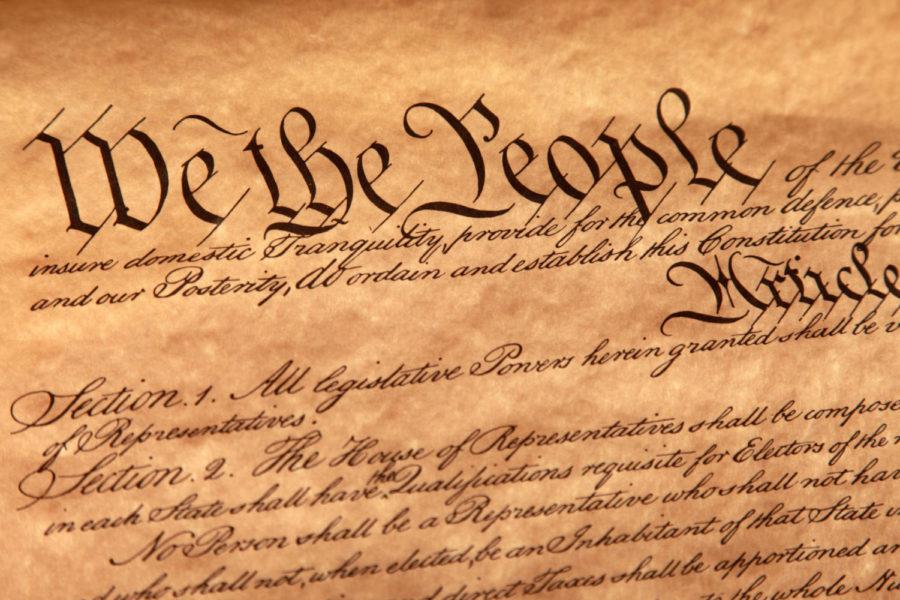Salo: Know your rights
The Constitution and the Bill of Rights lay out the fundamental rights of American citizens but most don’t know what these rights include.
May 25, 2017
“Love trumps hate.”
That’s what a transgender Newton High School student was writing on his arm during gym class one day last November. When teacher, Brian Smith, saw the Hillary Clinton campaign mantra written on the student’s arm, he told him, “don’t be drawing on yourself, girl.”
The student, who had clearly expressed his desire to be identified as a boy, thought Smith was joking because the school had previously been supportive of his wishes. But, when Smith brought the student to the attention of the principal, Dave Kalkhoff, he realized that it wasn’t a joke – it was a violation of his first amendment rights.
Kalkhoff told the student that he needed to wash off the writing or leave school. Not wanting to get in any more trouble, the student washed it off.
When classmates planned to protest the treatment of this student by walking out of school, the principal threatened to revoke the participating students’ varsity letters.
On February 24, the 48th anniversary of the Tinker v. Des Moines Independent Community School District case, which ruled that “students don’t shed their constitutional rights at the school house gates,” the Iowa American Civil Liberties Union delivered a letter to Newton High School.
The letter said that those involved in the punishment of the student had violated this student’s rights.
“The school seems to have engaged in both content discrimination,” said the ACLU. “And viewpoint discrimination, which is never permissible outside of specific instances of the promotion of illegal activity or violating the rights of others (such as being slanderous, libelous, bullying, harassing, vulgar or obscene).”
Bob Callaghan, the superintendent of Newton told the Des Moines Register that he is “committed to providing its students with a safe and positive learning environment. The district will take other responsive action as appropriate.”
Mary Beth Tinker, who filed a lawsuit in 1969 against Warren Harding Junior High after she was punished for wearing a black arm band in protest of the Vietnam War, posted a video message explaining her case and the case of the Newton student.
Her main message of the video was the importance of first amendment rights. She ended the video with the quote, “your rights are like your muscles – if you don’t use them, you could lose them.”
I agree with this statement – it’s important for us, as American citizens to utilize our first amendment rights, but some people don’t even know what rights the first amendment has given us.
The first amendment comes with five freedoms: freedom of religion, freedom of speech, freedom of the press, freedom of assembly and freedom to petition the government for a redress of grievances. The first amendment freedom that is most known is the right to free speech. In 2010, the New York Times reported that 61 percent of Americans knew that free speech was covered by the first amendment. But less than 30 percent knew about any of the other rights.
Why doesn’t the public know as much about their other rights? Is it because the debate on what is covered by free speech is so controversial and therefore has been in the media more often than the others? Is free speech more important than the other rights?
“The First Amendment directly covers freedom of religion, speech, the press, assembly, and petition, and by extension could be thought of as covering just about anything related to those already-broad matters,” said Mack Shelley, the department chair of the political science program at Iowa State. “Freedom of speech, in a sense, does subsume the other freedoms listed in the amendment, which are about various ways of expressing one’s positions or beliefs.”
So, free speech could be seen as an umbrella right over the other first amendment rights – you need free speech in order to utilize your other rights.
No matter the reason, Americans need to know about all of their rights so that they can determine when authority figures are trying to take them away.
The student at Newton High School knew his rights and realized that the administration was at fault, so he spoke up and people listened.
Because of this, the administrators at Newton High School have worked to right this wrong by apologizing to the student and have established a program to educate their staff and students on the first amendment.
This is what we all need to do – educate ourselves.
“Ignorance creates an environment in which it is easy for the powers that be to come up with Orwellian logic (freedom is slavery, war is peace, we had to destroy the city to save it, and similar oxymorons)” said Shelley.
If you don’t use your rights, you can lose them and if you don’t even know your rights, there’s no way you can use them or know that you’ve lost them.







